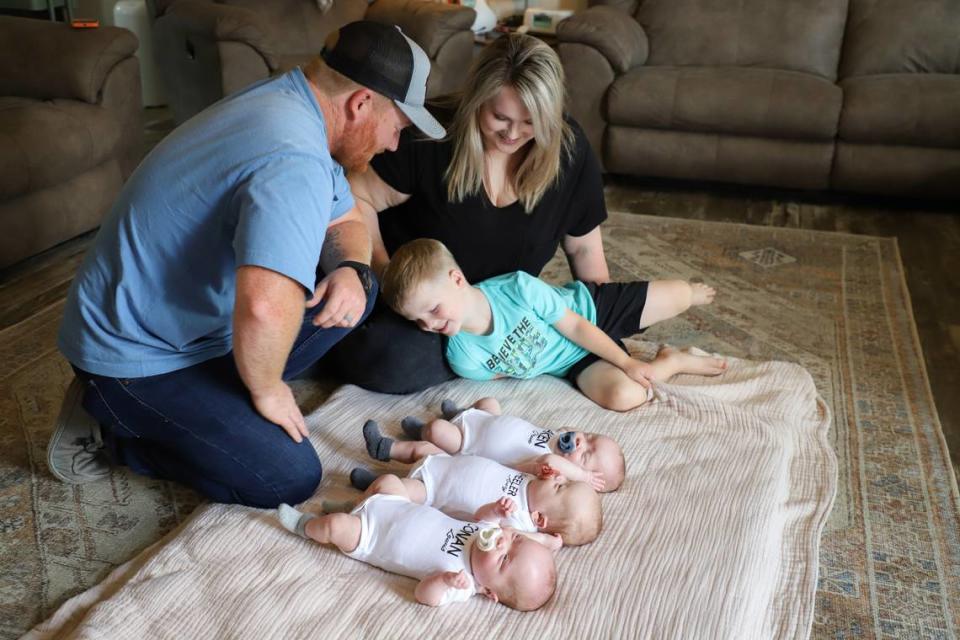They agreed on just one more, and ended up with triplets — in the unlikeliest way possible
There was a time, not so long ago, when Josh Mosteller was perfectly content with having just one child. Actually, to put a finer point on it, he was pretty adamantly opposed to more kids.
“I had been asking and asking,” his wife, Hannah, recalls, laughing.
Their son Ryder, born amid the pandemic in May 2020, “was about a year old and she was ready to have another one,” Josh says. “But then I was like, ‘Nah. I think I only want one.’”
For the next two years, Josh stood his ground. He relented only after Ryder turned 3, mainly because he felt guilty: By then, father and son were together more often than not, mostly outside, putting up fences, cutting down trees, and doing all the other things fathers do with sons when they live in a rural farming community like Vale in Lincoln County. “So it got to the point,” Josh says, “where I was like, Well, maybe we’ll try for another one so she’ll have her a companion at the house while we’re out working.”
“It was hard work getting him to agree to have another baby,” Hannah says. “He finally said yes ... but he was like, ‘One more. Don’t ask again!’”
As they started dreaming about that companion for Hannah, they both kind of pictured a baby girl. But they knew it was just as possible that Ryder would wind up with a younger brother. In other words, they assumed they were dealing with close to 50/50 odds, like any couple planning to have a baby probably would.
Instead, in the most dramatic fashion possible, their expectations were tossed out.
Early last September, the Mostellers were blindsided by the news that they had conceived identical triplets, which occur spontaneously (that is, without the use of fertility treatments) only in extremely rare instances. Studies have indicated that women having three genetically identical embryos occurs as rarely as once in a million pregnancies — or more.
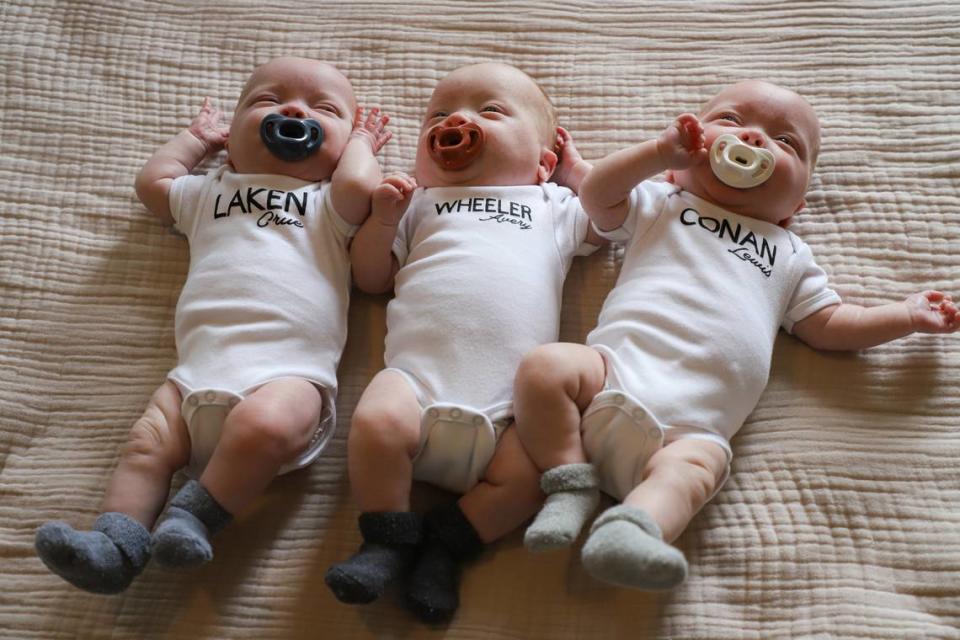
“I finally said yes to one more,” Josh says, shaking his head. “And then, uh, we found out we were having three more.”
But processing that shocking news would be the easy part. As it turned out, they would face long odds again on the way to keeping all three boys alive, bringing them into the world, and getting them home healthy.
‘I knew we couldn’t just have one!’
At about eight weeks — after she’d learned she was pregnant but before having her first ultrasound — Hannah had a bit of a panic.
She’d started spotting, and quickly became concerned about the possibility of a miscarriage or other serious complications. When she called and learned her OB couldn’t get her in for a couple weeks, she and Josh drove 20 minutes up the road to Heartbeats Women’s Center, a crisis pregnancy center in Maiden.
They just wanted to make sure there was still a heartbeat. But during the ultrasound, the sonographer initially detected two.
Josh threw up his hands.
“Oh, Lord!” he howled, as Hannah laughed at him. “I knew we couldn’t just have one! OF COURSE! That’s my luck!”
Then, because Hannah was so early in her pregnancy, the sonographer decided to do a more detailed type of ultrasound — and upon seeing the image, looked at another clinic staffer. The two then started whispering with each other. For a minute, Hannah thought something was wrong.
Finally, the technician announced, “There’s another friend.”
Hannah’s eyes bulged. “Shut your face!” she blurted. “There ain’t three in there!”
“Hold on,” the sonographer cautioned. “Let’s make sure, let’s make sure.”
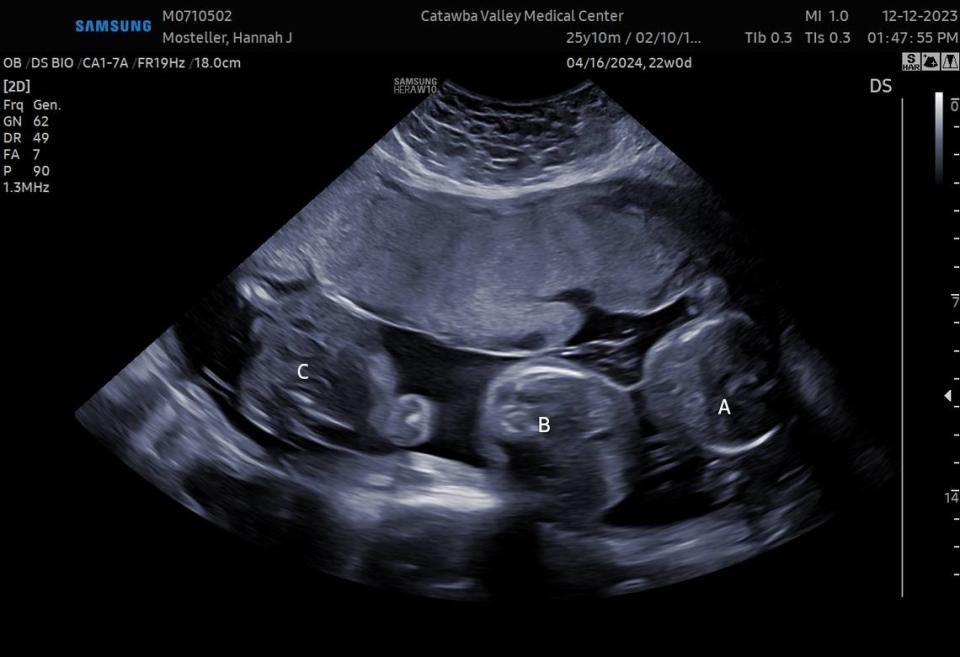
Two healthcare providers were called into the room. They scratched their heads, then summoned a couple more colleagues. None of them had ever seen triplets before. But at this point, they were sure. Hannah had not one, not two, but three babies growing inside of her.
“Are y’all OK?” the staff kept asking Josh and Hannah. “Are y’all OK?”
“Yeah,” Josh said. “I mean, there ain’t nothin’ we can do about it. It is what it is.” He shrugged. “God’s got a plan. I sure don’t.”
The Mostellers walked out of Heartbeats excited but stunned, climbed into their car, looked at each other, and laughed. Both were wondering the same thing: What in the world are we going to do now?
And while they were still in the parking lot, they had agreed on an answer — and reached for their phones.
Hoping for a little help from above
When she was pregnant with Ryder, Hannah had waited months to make their news public. But they started calling to tell family about the triplets practically within minutes.
Josh and Hannah were extra-eager to share, of course, given the astonishing nature of it all.
As much as anything, though, they were hoping for help from above.
The couple understood that carrying triplets increased the risk of complications considerably, both for Mom — who would be more likely to develop problems such as gestational diabetes, preeclampsia, and anemia — and for the babies growing inside her; miscarriage, stillbirth, premature birth, and disability are more common with multiples.
So, says Hannah, “We just wanted to get people praying right away. We were like, ‘We have to tell, because the more people praying, the better.’”
One of the first calls they made was to Hannah’s aunt, Stacy Cox, who lives in the tiny nearby Lincoln County community of Crouse.
Stacy knew her niece had gone to Heartbeats, and when her daughter Jasmine called to say Hannah was done with her appointment and wanted to talk to them at the same time, Stacy braced herself for bad news. Oh gosh, this is not good, she thought. Hannah must have had a miscarriage. “But we got on Facetime, and they showed the ultrasound picture. ... Then I saw the labels — ‘A,’ ‘B,’ ‘C’ ... and at first I thought they were just labeling, like, the arms, legs, head. ... Then it hit me. I was like, ‘THREE BABIES??’”
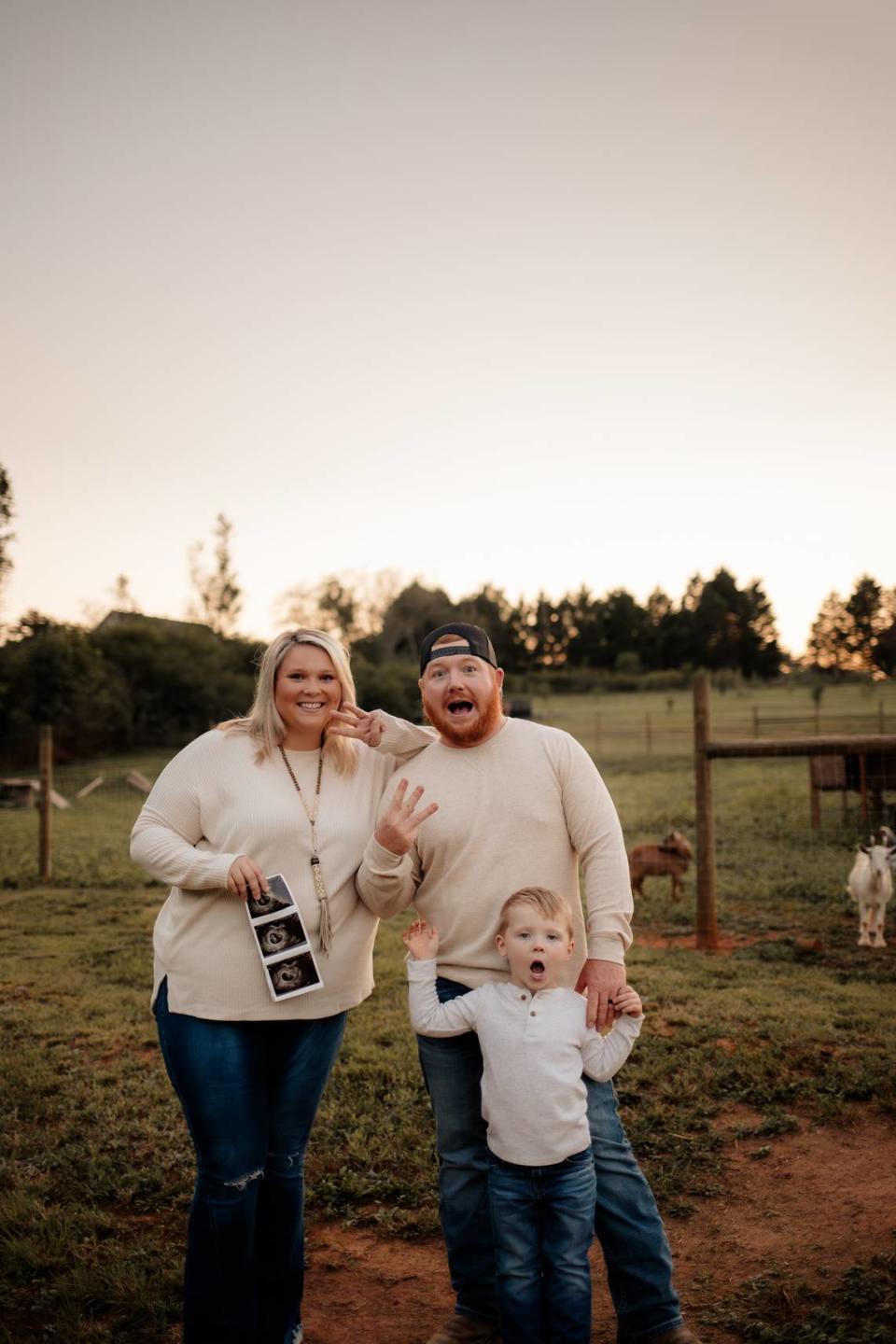
But while they all were able to laugh a lot that day, mostly in disbelief, they would soon learn how serious this triplet business was.
Within just a couple of weeks, Hannah’s OB/GYN asked the Mostellers to find another provider, explaining that they needed a maternal-fetal medicine physician experienced in dealing with unusually high-risk pregnancies.
The first one they tried was an hour away, in Charlotte. At their initial appointment, still in September, the doctor determined via ultrasound that one of the babies had a type of birth defect called a cystic hygroma, which can increase the risk of miscarriage and stillbirth or lead to genetic conditions like Down syndrome. The doctor’s recommendation was “selective reduction,” which is the clinical term for aborting one or more fetuses.
Josh and Hannah never seriously considered it.
“He had a perfect heartbeat,” Hannah says. “And with our faith, we don’t believe in reducing, or aborting, or anything, for no reason. I’ll just say it like that. ... I was like, even if there is a genetic disorder, OK, then we’ll just adjust our lives to the genetic disorder. We weren’t gonna —”
She pauses, and Josh finishes the thought for her: “— just get rid of the baby.”
By this point, Stacy was building an army of prayer warriors for Josh and Hannah via a Facebook group she’d created and named “Many Mini Mostellers.” Eventually, the couple was turned on to Hickory-based Catawba Valley Medical Center’s maternal fetal medicine group, which partners with physicians at Atrium Health Wake Forest Baptist Health in Winston-Salem.
Doctors there had good news for the Mostellers: There was no longer any evidence of a cystic hygroma.
But they had some bad news, too.
‘Don’t expect to see three heartbeats’
Melissa Kozakiewicz has been an OB/GYN for 14 years, eight of them focused on maternal-fetal medicine.
In that time, she says, she’s cared for just one other set of identical triplets. This case, however, was singular for the Atrium Health Wake Forest Baptist physician; it marked the first time she’d ever diagnosed a set of triplets with twin-to-twin transfusion syndrome. That’s caused when the vessel connections within the shared placenta are unevenly dispensed, leading to imbalanced blood flow between the babies.
If untreated, she knew, at least one of the triplets likely would die.
Kozakiewicz quickly referred Hannah to a team at Johns Hopkins Hospital in Baltimore, that had experience with the complex laser ablation therapy that could correct the problem. There were, however, hurdles to overcome.
The first was financial. Hannah eventually would get approved for Medicaid, which retroactively covered the procedure, but at the time they also needed to figure out how to pay for the basic costs of making the 900-mile round trip. So Stacy put out a call for prayers on Facebook, and the growing following answered them with donations that would take care of every one of their expenses.
The second (much scarier) hurdle, meanwhile, was mathematical. There was only a slightly better than 20% chance that all three babies would make it through alive at just 17 weeks, about as early as the procedure can possibly be performed.
“Don’t expect to see three heartbeats after this surgery,” Josh recalls being told.
Again the family asked for prayers, but this time money wasn’t the answer. All they could do was wait. And although there were three heartbeats immediately after the surgery, the team at Johns Hopkins warned that it could take a day or two to determine whether the procedure had indeed balanced out the blood flow.
Twenty-four hours later, Josh says doctors and nurses expressed surprise that three heartbeats were still present. Seventy-two hours later, Josh and Hannah were told it was safe for them to return to North Carolina.
“The fact that they all survived,” Kozakiewicz says, “is just incredible.”
Equally incredible was the fact that the sole placenta continued to efficiently supply nutrients to all three babies in their separate sacs for another 12 weeks, late into this past January. But finally, as the placenta started to give out, Molly Setzer — their OB/GYN at Catawba Valley Medical Center — decided it was time.
And on Jan. 31, at 29 weeks of pregnancy, Hannah gave birth to three-pound Wheeler Avery and then 3.5-pound Laken Crue at 3:35 p.m., followed by 3.1-pound Conan Lewis at 3:36.
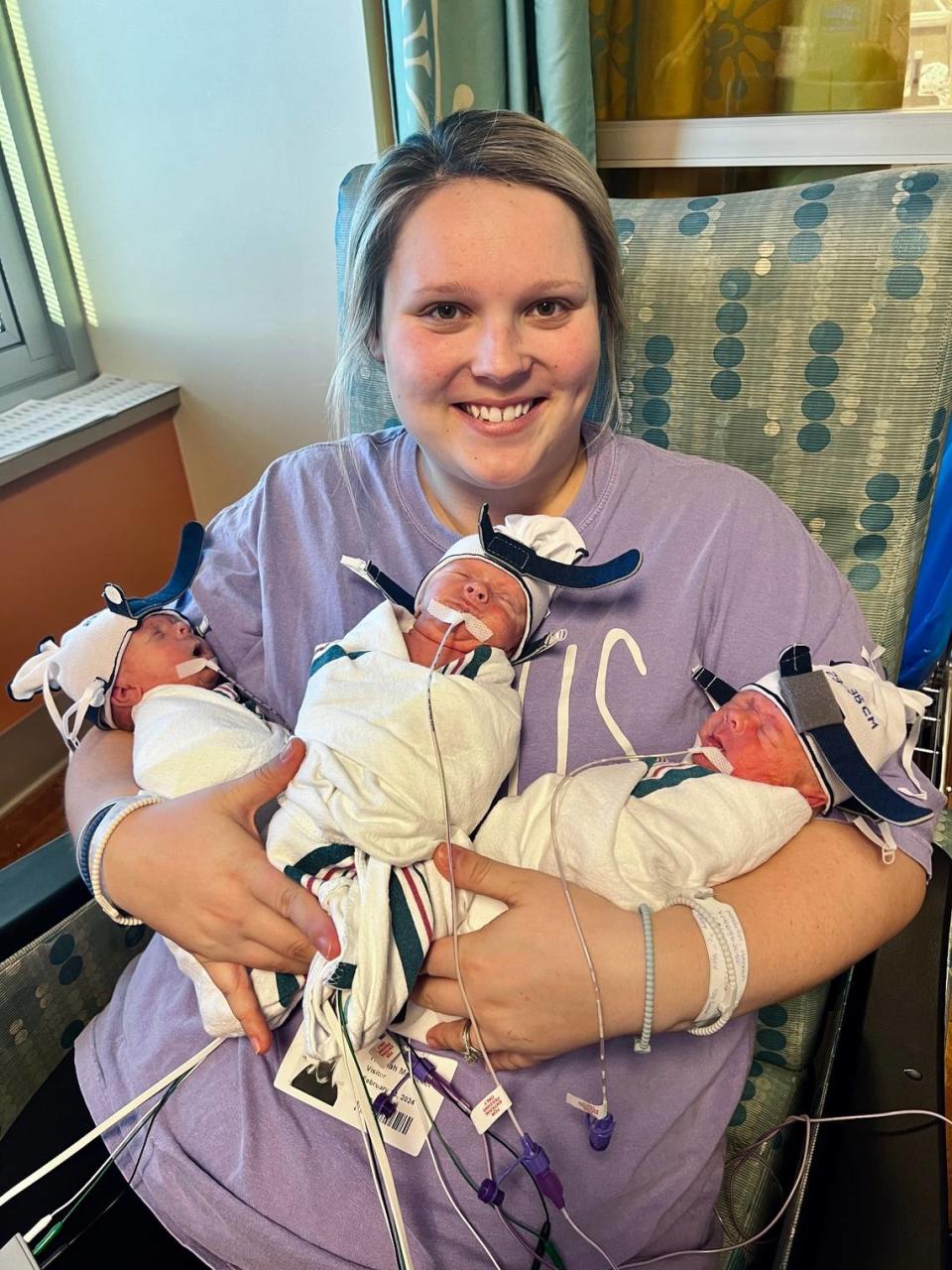
In Setzer’s 11-year career, she’d never delivered triplets that had been in three individual sacs but sharing one placenta.
The boys would spend more than two months in Catawba Valley’s neonatal intensive care unit, and they had their share of typical preemie problems.
“Surprisingly,” Setzer says, “considering how high-risk this pregnancy was, their NICU course for the most part was pretty straightforward, uncomplicated. They were what we call feeders and growers for the most part. ... I actually think when babies are stressed in the uterus, they end up doing much better in the NICU, because they already have kind of that stress response that has helped make them a little bit stronger.”
In any event, she says the fact that they’re all doing so well now — they’ve grown to about 11 pounds each — is “incredible,” given everything the triplets have had to overcome.
“I’ll probably not forget this one in my career.”
Would they consider having ... more?
More than a month after their triplets were discharged from the NICU, the Mostellers can still seem a little shell-shocked.
It might be because they’re in a vortex of a feeding cycle that involves giving each of the infants a bottle every three hours, around the clock. It might be because — after frequently being separated from their newborns while they were in the NICU — Josh and Hannah aren’t yet ready to sleep apart from them, and have thus turned the family living room into one giant bedroom.
“The other night we were changing them and I was like, ‘You know we’ve slept on the couch for a month straight now?’” Josh says, shaking his head. “But that’s fine.”
“You do what you gotta do,” Hannah chimes.
They don’t sound defeated, or irritable, or even the least bit like maybe they wish this hadn’t happened. Rather, they’re smiling at each other, and laughing with each other, and by all accounts, the Mostellers have made the past 10 months appear to go a whole lot more smoothly than it really has.
“Obviously they were very upset and sad and all of those emotions you’d feel if you heard that your babies might not survive,” says Kozakiewicz, the OB/GYN who referred them to Johns Hopkins, “but they just took it one step at a time and one day at a time and they just were so great. Not all patients are like that.”
“They were very, very, very, super-calm when they found out they were triplets,” says Hannah’s aunt, Stacy. “They’ve been calm through this whole entire journey, and yeah, you go over there and Hannah just smiles and takes care of ’em. I think they’re gonna be phenomenal. I think that they’re gonna be the best parents that God could’ve ever chosen for those little triplets.”
As for Hannah and Josh, they think the explanation for their coolness and collectedness is simple.
“I mean, we just had faith all the way through it,” Josh says.
“What verse kept going through my mind was, ‘What is impossible with man is possible with God,’” says Hannah, quoting Luke 18:27. When she said her prayers on the eve of her surgery in Baltimore, she told herself, “The 20% chance sounds like man’s hands are tied. So God can step in and do this.”
And today — with her boys all happy, healthy, alive and together — the Mostellers are as confident as ever about these things: Number one, God’s got big plans for Conan, Laken and Wheeler. Number two?
“I ain’t having no more,” Josh says, as he and Hannah both break into laughter and reveal that she got her tubes tied after the babies were delivered by Caesarean in January. “I’m happy. Don’t get me wrong. It was a blessing. Children are a blessing for sure.
“But four? That’s plenty.”
